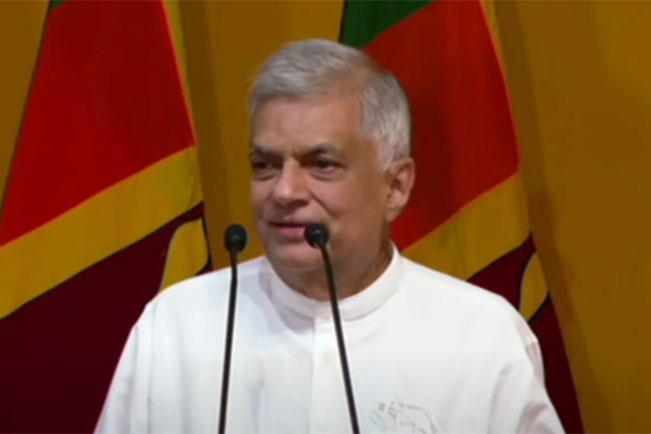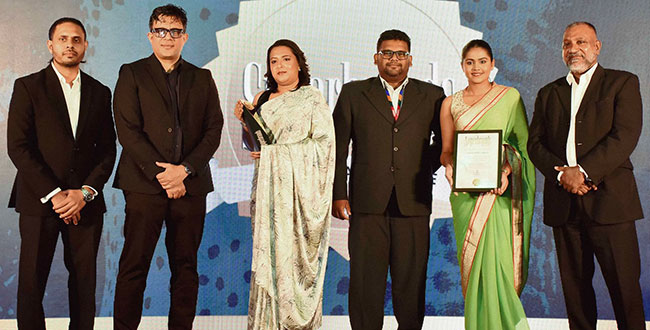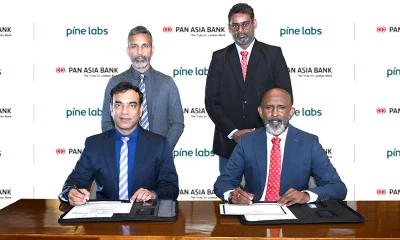Business
President motivates mass movement at ground level to form inclusive government

Says Sri Lanka can enter new politics after fixing urgent economic issues
By Sanath Nanayakkare
President Ranil Wickramasinghe said on Saturday that Podu Jana Peramuna and UNP politicians should talk to all other political parties including the SJB, JVP and TNA in order to create a mass movement at the ground level to push for an all-party government.
“If our economy slides any further, the country wouldn’t be in existence. Our inflation will increase further. This year our GDP will contract by 7%. That’s a big negative growth number. Next year, with the steps we have taken, the contraction would be about 3%. In the following year, we will be able to achieve 1% surplus in our primary account. I am not saying these to frighten anyone. Solutions for these challenges must be found first. Sri Lanka can enter new politics after finding solutions to its urgent problems at hand,” he said.
The President made these remarks in Kandy on Saturday addressing a group of Podu Jana Peramuna and UNP politicians functioning mainly at local government level.Some excerpts from his speech are as follows.
“Don’t restrict your unity to just two political parties. Take that spirit of unity beyond, and rally round everyone to rebuild the country. If their preferred political parties want to contest elections separately, that’s okay. But you should talk to the people in the villages, tell them the truth and win them over to work together and pull the country out of its economic abyss. Don’t remain silent.”
“As you know, a massive economic pressure emerged in the country. A political change occurred as a result of this economic pressure. President Gotabaya Rajapaksa exited, I became the President and Dinesh Gunawardena took over as Prime Minister. This change occurred because of the economic explosion which stemmed from severe shortages of fuel, fertilizer etc. These unprecedented events motivated the people to start a peaceful struggle against the government. But later on this peaceful struggle (Aragalaya) was taken over by other organizations under the pretext of Aragalaya. For the first time in Sri Lanka, we experienced Fascist terrorism. The LTTE assassinated people by shooting and bombing. Setting fire to houses and book collections was something learnt from Adolf Hitler. Surprisingly, these Fascist groups were joined by many others in the civil society. At such crossroads, I took over the presidency. Although I took it over, the economic burdens of the people have not alleviated. People’s day-to-day issues are still the same. They still live amid shortages of fuel, fertilizer, cooking gas and job insecurity. Also, we lack the capital to carry out development programmes in the villages. Now the question before us is; are we going to reduce the burdens faced by the people or increase them instead?
“Repeating old slogans won’t help us if we don’t find solutions. Some people say that this economic crisis was created because of President Gotabaya Rajapaksa’s decision to ban the import of chemical fertilizer. The UNP says the crisis came about because we didn’t seek assistance from the IMF in time. The Podu Jana Peramuna says it happened because the previous government took out large loans. Now, what are we going to do? Are we going to debate continuously, or act to resolve the issues together? Debating would be productive if it could bring in a shipment of fuel or fertilizer. Debating would be productive if that could get us USD 50 million funding from the IMF. If that doesn’t happen, no debate will help develop the country. We have now got to this point and one can write books and analyses about them. Some people want to organize processions demanding ‘Ranil Go Home’. I’d like to tell them, please don’t do it. I don’t have a home to go to. If you are willing, bring in a crowd of people to rebuild my torched house. And once I have resettled there, you can go past my house saying, ‘Ranil Go Home’. Otherwise there is no point in asking a man without a home to go home.”
“We are in traditional politics where we point fingers at one another and put the blame on others. But doing so will not help decelerate our high inflation. Doing so will not help increase our GDP. We have to find the money to purchase fuel, and fertilizer for Maha season. That’s the challenge and our politics should be able to enable it, to facilitate it. That’s what we should be doing. As prime minister and finance minister I discussed with the IMF and we found a potential recovery programme. My objective was to reach the IMF staff level agreement in July 2022 and have it approved by the IMF Executive Committee in the beginning of August 2022. Now it will defer till end of August because discussions stalled since July 9. In this backdrop, a staff level agreement could be reached by end of August also because of the holidays of the month. So we would be able to get an IMF facility approved by its Executive Board in September 2022.”
“The political instability delayed the IMF programme. Unless we have consensus among us nobody will lend us any money. Are we going to continue our familiar behavior in politics? We must think anew. The youth first came to the site of Aragalaya insisting on political and economic reforms. I have no debate about it. What the youth insisted on in the first place was very relevant and they need to be accepted. However, later on others took it over and diverted the peaceful protests towards violence.”
“Let’s not think that once we get a facility from the IMF, our problems will go away. The weight of our loans will increase. So how do we repay the loans? To repay our loans, we need more foreign exchange. We need to explore new ways of boosting our external revenue. Modernization of agriculture is one way to do it. Are we going to make policies and implement result-oriented reforms, or are we going to just shout slogans?”
“Politicians of Podu Jana Peramuna and UNP need to understand this and work together. If we don’t do that the country will be ruined and the younger generation will curse us. Today’s challenge before us is; are we going to fall or stand back on our feet. The Parliament is facing this very challenge today. The President, the Cabinet and other organizations are facing it today. How do we face up to this and build a new Sri Lanka? How do we create a stronger middle class? How do we embrace modern agricultural practices to harness the best yield and productivity? How do we pursue an export-oriented economy? That’s the path we should take right now. The economic model that exists today is the one that initiated by President J.R.Jayawardena. I was part of it. Its effectiveness has lasted its time. We can’t go back to those policies or economic models in British or Kandy eras. We must think anew, understand the global market and adapt to it as a country to gain from it. We must modernize our villages. We don’t still have a digital economy and we must establish it. We must take on the responsibility of these initiatives and move on.
Which is better; are we going to the villages with this message as separate political parties or are we going to do it as one unified group of people? Because of your quietude, there is a political vacuum in the villages today. Are we going to let others divide the people? I would never have agreed with setting fire to houses, books and property. We shouldn’t let our political differences destroy our friendships. We should have a new beginning. So as people’s representatives you should carry the message of unity – which is meant to resolve the crisis – to the villages without being quiet. Your best effort would be working at the ground level to create a massive people’s voice to push for the formation of an all-party government. For that you have to reach out to everyone without any political differences.”
President Wickramasinghe also said that a programme would be introduced in two weeks at village level to tackle food insecurity and livelihoods insecurity.
Business
Newburgh Ella set to fill a critical gap in luxury hotel infrastructure

Strategic Rs. 1.5 billion project by Browns Hotels & Resorts under LOLC Group
The Sri Lankan leisure landscape saw a significant addition on January 30, 2026, with the official opening of Newburgh Ella – The Tea Factory Resort. This Rs. 1.5 billion project, a strategic diversification by Browns Hotels & Resorts under the LOLC Group, transforms a 123-year-old tea factory into a luxury destination designed to capture the growing global interest in Ella.
The resort is housed in a structure originally established in 1903 by Scottish planter George Thomson. During the conversion, LOLC ensured the core structure was preserved, even reusing steel and other structural raw materials to maintain the factory’s industrial soul.
“We decided to transform it into a hotel without harming the core structure, ensuring the prevention of nature,” noted Gangadaran Velsamy, General Manager of Newburgh Ella. This commitment to sustainability extends to the resort’s operations, which follow a fully paperless concept and are currently undergoing LEED and green certification processes.
At the helm of the hotel’s operations is Gangadaran Velsamy, the seasoned professional with over 25 years of experience across 10 international and local hotel brands, including Dubai One and Only and Taj Samudra. A graduate of the Ceylon Hotel School, Velsamy brings a mission-driven approach to the property.
“My mission is to make Newburgh Ella the best hotel in Ella that offers nothing but the best for the guests that Ella couldn’t offer ever before in its history,” Velsamy told The Island Financial Review. His management style is notably people-centric, utilising multiple management approaches to maximise the potential of his human resource.
A key highlight of the project’s “human side” was the absorption of the original Finlays tea factory staff. These employees underwent six months of intensive theoretical and on-the-job training at 5-star properties to transition into the hospitality sector.
Further supporting the local economy, 50% of the hotel’s workforce is recruited from the immediate neighborhood. This integration is reflected in the resort’s service culture; for instance, pre-booked restaurant tables are marked with “Promised” tags rather than the standard “Reserved,” signaling a deeper level of commitment to the guest.
Newburgh Ella features 41 rooms categorised as Silver, Gold, and Bronze – a naming convention inspired by tea tips. Room rates range from USD 250 to 350 per day (approximately LKR 75,000 to 100,000).
Key Facilities Include:
1903 – The Dining Room: An all-day dining venue.
Eastern Valley: An open-air restaurant specialising in Asian fusion.
George Thomson – The Founder’s Tavern: A bar named in honour of the factory’s founder.
Three Tips Tea Lounge: A dedicated space for tea tasting and the “living tea experience”.
SKY Observation Deck: Offering views of Ella Rock and Little Adam’s Peak.
From a business perspective, the resort addresses a critical need for high-end infrastructure in Ella, a destination famed for its “exhilarating vibes” but often underserved in the premium segment.
Eksath Wijeratne, CEO of Browns Hotels & Resorts, expressed confidence in the property’s financial trajectory, estimating a breakeven point within five to six years.
“If we see Sri Lanka achieving more arrivals in correlation with increased revenue inflows, we should be able to reach a breakeven within a shorter period,” Wijeratne stated. He emphasised that the resort is a key piece of infrastructure to boost foreign currency earnings, attracting discerning travelers whose spending directly bolsters the country’s economy.
Ultimately, the success of Newburgh Ella lies in its details – such as the “Promised” tags on restaurant tables that replace the cold, standard “Reserved” signs. This subtle shift in language, championed by Velsamy’s team, encapsulates the resort’s mission: to honour a century of history while delivering a standard of service that Ella has never before hosted.
The “gastronomical delights” of Newburgh Ella are presented perfectly with the seasoned artistry of Chef Senthilkumar. Having spent over 18 years refining his craft across the luxury landscapes of Dubai, Kuwait, and the Maldives, the Chef transforms world-class techniques into unforgettable dining experiences, redefining the art of the meal in the heart of Ella.
In addition to Newburgh Ella’s refined hospitality and “yummy” gastronomy, guests have easy access to the region’s crown jewels such as Ella Gap and Ravana Cave to the thundering beauty of Ravana Falls.
By Sanath Nanayakkare
Business
A deep dive into Fitch Lanka report shows ‘Resilience of the Few’

The domestic credit landscape is currently anchored by a handful of high-performing institutions that have displayed significant resilience through the nation’s most turbulent years, a deep dive into the latest monthly report of Fitch Lanka shows.
While the public often equates the often-adulated private sector credit growth with widespread business expansion, the Fitch Lanka data shows a concentration of capital among the country’s elite ‘blue-chip’ firms.
This latest assessment from Fitch Ratings (Lanka) Ltd. is being hailed by experts as a vital assessment for the country’s financial system. While the technical details of credit ratings can seem dense, an independent economic analyst told The Island Financial Review that these reports act as a ‘global report card,’ fundamentally demonstrating how much international trust is placed in Sri Lankan enterprises.
According to the analyst, the ratings issued as of January 31, 2026, serve as more than just corporate scores; they are the primary benchmark used by global investors to determine the safety of bringing capital into the country.
“High ratings are essential for attracting Foreign Direct Investment (FDI), which is the engine for job creation and infrastructure development. These scores are critical for trade finance, allowing local businesses to import essential goods and export products without friction. The ratings provide a real-time snapshot of how Sri Lankan entities are viewed within the highly competitive global capital markets,” he said.
“Banking sector stability is crucial here. Major institutions like Commercial Bank and HNB maintain strong long-term positions. Meanwhile, blue-chip firms including Dialog Axiata PLC and Hemas Plc continue to operate within the elite AAA(lka) to AA(lka) range.The presence of top-tier firms in the ‘AAA’ to ‘AA’ range indicates a robust internal capacity to meet debt obligations, providing a buffer even when the global economy is unpredictable,” the analyst noted.
When asked if the contents of the report may encourage investors to pay close attention to entities appearing in Red font, the analyst said that he views it as a ‘vital signal’ of a dynamic and transparent market rather than a sign of crisis,
“Entities such as JAT Holdings and CIC Holdings PLC have recently undergone rigorous reviews. This scrutiny is largely centred on the manufacturing and agricultural sectors, which are currently adapting to volatile global supply chain trends.
Looking forward, the ability of these ‘Red font’ companies to stabilise their outlooks will serve as the ultimate litmus test for the national economy.If these key players can maintain their scores and stabilise their trajectories through the middle of the year, it will be a definitive indicator that Sri Lanka’s broader economic path is secure,” the analyst said.
When asked if this was the case across the board including SMEs, he replied,” In fact, a deeper dive into the latest assessments by Fitch Ratings Lanka reveals a different reality: the engine of this credit growth is not the average entrepreneur, but a select group of ‘big ticket’ corporate giants.
” A superficial glance at the financial headlines might suggest a private sector in the midst of a borrowing spree. With the Central Bank reporting a notable 25.2% year-on-year growth in private sector credit as of December 2025, the outlook of a broad-based economic awakening is tempting. However, the Fitch Ratings Lanka monthly report reveals a different reality: the engine of this credit growth is not the average entrepreneur, but a select group of ‘big ticket’ corporate giants. In essence, these are the ‘safe harbours; where capital is currently docking.
“The data provided by Fitch Ratings Lanka underscores a critical distinction in the 2026 economy that credit is indeed flowing. And the authorities are rightly encouraged by private sector growth. Yet, this is not a tide lifting all boats; it is a strategic fortification of the nation’s most resilient pillars. As the year unfolds, the strength of these ‘big ticket’ borrowers will determine whether the rest of the private sector can eventually follow their lead into a more prosperous era or not,” he noted in conclusion.
By Sanath Nanayakkare
Business
Moose Clothing Company earns Superbrand 2026 recognition

Moose Clothing Company has been recognised as a Superbrand for 2026, a proud milestone for a young Sri Lankan brand that has grown steadily through trust, consistency, and a strong connection with its customers. The award ceremony was held on 12 January 2026 at the Hilton, celebrating brands that have earned lasting respect and loyalty.
Superbrand status is not awarded lightly. It is reserved for brands that demonstrate excellence beyond numbers, brands known for quality, reliability, emotional connection, and long-term relevance. Selection is based on independent research, expert evaluation, and consumer perception, making it one of the most respected recognitions a brand can receive.
For Moose Clothing Company, this honour is especially meaningful. Founded with a simple belief that Sri Lankans deserve well-made, thoughtfully designed clothing at honest prices the brand has grown by listening closely to its customers and improving with every season. From everyday essentials to performance wear, Moose has focused on getting the fundamentals right: fit, comfort, durability, and value for money.
Commenting on the achievement, Hasib Omar, CEO of Moose Clothing Company, said:
“Being named a Superbrand is deeply meaningful for us because it comes from trust. Moose is still a young brand, and this recognition belongs to our customers who believed in us from the beginning, our teams who work with care and purpose, and everyone who chose Moose Clothing Company as part of their everyday life. It reminds us why we started and encourages us to keep building with integrity.”
-

 Features2 days ago
Features2 days agoMy experience in turning around the Merchant Bank of Sri Lanka (MBSL) – Episode 3
-

 Business3 days ago
Business3 days agoZone24x7 enters 2026 with strong momentum, reinforcing its role as an enterprise AI and automation partner
-

 Business7 days ago
Business7 days agoSLIM-Kantar People’s Awards 2026 to recognise Sri Lanka’s most trusted brands and personalities
-

 Business2 days ago
Business2 days agoRemotely conducted Business Forum in Paris attracts reputed French companies
-

 Business2 days ago
Business2 days agoFour runs, a thousand dreams: How a small-town school bowled its way into the record books
-

 Business2 days ago
Business2 days agoComBank and Hayleys Mobility redefine sustainable mobility with flexible leasing solutions
-

 Business7 days ago
Business7 days agoAPI-first card issuing and processing platform for Pan Asia Bank
-

 Business3 days ago
Business3 days agoHNB recognized among Top 10 Best Employers of 2025 at the EFC National Best Employer Awards













